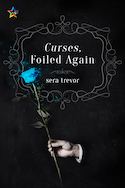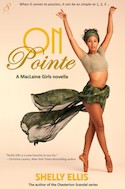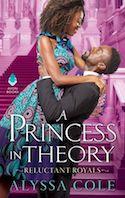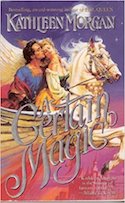Kissing Books: taking it on the ego
Every month, Olivia Waite pulls back the covers, revealing the very best in new, and classic, romance. We're extending a hand to you. Won't you take it? And if you're still not sated, there's always the archives.
My favorite alpha heroes in romance are the fragile ones.
They don’t seem fragile, at first. Consider Alec Kincaid from the RITA-award winning classic romance The Bride. He’s a big, burly Scotsman, the much-feared laird of his clan, who kills enemies easily and without a second thought. He’s manipulative and self-centered and emotionally closed-off after the mysterious death of his first wife. He is the most important man in his world, and he’s not afraid to throw his weight around and give orders to absolutely anyone short of his king.
In short, he is a giant ego-balloon, and the bigger he swells the more fun it is to buckle in and wait for the inevitable pin to find him.
Because of course Alec’s self-inflation has to be punctured. Anyone who’s read more than, say, three romances can see it coming from chapter two. He’s going to be matched with a tiny, too-pretty, naively optimistic virgin with violet eyes named Jaime, and this insignificant non-entity — with no physical strength, legal power, or wish to do harm — is going to turn him entirely inside out. She’s going to disobey him, undermine his authority, and fearlessly demand what she needs. She’s going to convince him she’s right to want to help people, to be kind, to trust others. She’s going to make him question everything about himself, and — here’s the kicker — this big, tough, weathered warrior is going to be grateful for all the changes. Because a romance hero may be strong at the start of the book — but it’s the events and transformations of the plot that turn him into a hero.
As much as we talk about alpha males in romance, ego-balloons are not only carried by musclebound alpha heroes. Elizabeth Bennet in Pride and Prejudice famously has her own self-regard deflated a bit before the happy ending. Shelly Laurenston’s shifter heroines tend to be as sexually frank, egotistic, and casually violent as the heroes. (That’s a compliment, by the way: those books are fun.) And there’s a whole strain of romantic comedies where the hapless city girl in too-high heels has to learn humility from a hard-working country boy in work boots. General patriarchal pressures often apply: there are too many toxically masculine heroes who aren’t de-bro-ified enough, and far too many haughty (or simply human) heroines whose abject embarrassment we’re supposed to wallow in. The lines are all highly subjective: one reader’s too far is another’s not far enough for what they did/said.
I started thinking about egos and punctures while reading Alyssa Cole’s upcoming A Princess in Theory (reviewed below). Our hero Thabiso is a handsome, educated, wealthy prince from the South African nation of Thesolo; he’s been raised with all privileges and the weight of decision on his broad, young shoulders. It has not, shall we say, left him struggling with the burden of self-doubt. Heroine Ledi has mistaken him for the new waiter she was supposed to train, and to get close to her, Thabiso plays along: “He was feeling rather pleased with himself. Not only was he an excellent negotiator and a shrewd businessman, but having completed the tasks assigned him, he was well on his way to becoming a master waiter, too.”
This is the ball being tossed in the air.
And then the racket comes around and whack: ten minutes later, our master waiter is dumping fish into the lap of a VIP, setting fire to the fondue station, and getting unceremoniously fired by our heroine.
It’s all about the expectations. Romances live and die on the alchemical reaction of reader expectations combining and combusting with the reality of the text. We expect a happy ending — but what has to happen first? We expect a hero to be, well, heroic — but what if instead he is, as the old Princess Bride blurb goes, a son of a bitch? Of course there are plenty of alpha heroes whose alpha-ness isn’t challenged because it’s the foundation of the fantasy (dukes, billionaires, vampire Viking angels), and while I understand the escape those books offer I find myself much more gratified by books where the alpha’s overweening ego is the set-up to an eventual well-earned punchline. It’s more dynamic, for one thing; it’s what Nisi Shawl points to when she talks about narrative tension: “the gap between ‘what is’ and ‘what must be.’” What is: the hero’s self-image. What must be: his transformation.
The ultimate result is something that has long been deeply uncool to talk about with respect to literature: a moral. When overbearing alphas change their tune, when egos get bruised and recover, there’s always a moral lesson in it. Sometimes it’s as simple as: Love matters. Sometimes it’s dark and complex and nuanced with, ha, over twoscore shades of grey. But very nearly all romance has some element to the plot that’s trying to tell you how to be a better person: sexually, emotionally, or among the people in your community. It’s why it’s not terribly far-fetched for Jennifer Weiner to argue in the New York Times that romance novels fill in a lot of gaps left by sex ed curricula that are either abstinence-centric, queerphobic, or both, or that limit the conversation around sexuality to mere biological terms while ignoring issues of consent, desire, and self-expression. There is a lot about sex that is more about words and thoughts than it is about body parts, and romance is the literature we’ve developed to grapple with that.
This month the egos are out in full force and they’re all — well, mostly all — cruising for a bruising. We have a self-involved vampire who is quite literally heartless; a brash dance student-turned-professional choreographer who has no problem telling his former dance teacher exactly what she can do with his now-grown self; the charmingly self-important African prince mentioned above; a frontier mail-order bride who’s frighteningly handy with a rifle; and a mercenary warrior heroine whose stubborn pride is mighty enough to change the destiny of her world.
Recent Romances:

Curses, Foiled Again by Sera Trevor (Ninestar Press: paranormal m/m):
Trends or no trends, a good vampire novel is never out of style. This offbeat gem is less Interview with the Vampire and more What We Do in the Shadows, with that blend of the comic and the horrific that’s so hard to get right and so delicious when done well. Felix is a vampire living in LA whose preternatural strength and thirst for human blood are balanced out by his wistfulness, impulsive sincerity, and the inescapable fact that he’s dumb as a bag of hammers (a side effect of the vampire condition). Watching him occasionally try to be cunning is adorable: think a Goth Jason Mendoza from The Good Place. He becomes annoyingly fixated on a witch named John, who is living under a truly frightening, isolating curse, and in the way of all romance they slowly annoy one another more and more intimately. There are some truly horrific moments in the course of the plot — as well as actual consideration of the predatory nature of vampiric feeding, which is not the lightest of reading — so best keep this book for a moment when you’re in the mood to shiver a little. But if you’re a horror romance fan (I see you! I know it’s hard to find your catnip!) then you’re going to want to give this one a try.
He paused for a minute, trying to put together all of the feelings inside of him, so many of them buried. He felt like an archaeologist, uncovering his own soul piece by piece.”

On Pointe by Shelly Ellis (self-published: contemporary m/f):
One way to quickly establish a heroine’s character is to show us who she is not. Here we meet Bina, a dance teacher at a DC studio, meeting her ex for coffee for the first time since she walked in and caught him cheating. She’s been lonely since the breakup, and she’s worried she won’t be able to resist him if he begs her to take him back. But that’s not why Carl wanted to talk. No, Carl has started his own architectural firm — in a partnership with the woman he was cheating with — and they have a big client who wants to buy Bina’s dance studio, tear it down, and built fancy-ass condos in the rapidly gentrifying neighborhood. And when Bina raises her voice in outrage at the callousness of this, Carl tells her not to be such an angry black woman.
What does our heroine do then? Bina dumps a full iced macchiato over his head and walks away, as coffee drips into the fine wool of her ex’s expensive suit.
Reader, by this point I was completely on her side.
And this was before we see how kind she is to her dance students, how much she loves her difficult mother, how hard she works to keep the studio from sliding into collapse. Meanwhile her former student, Maurice (Mo), now grown and hot as hell, has been hired to teach a hip-hop class in hopes of bringing in a new crop of students. Sparks fly, desires are denied, risks are taken, and romance blossoms. This is the set-up book for a three-novella series, so it ends with a bit of a cliffhanger and a Happy For Now rather than Ever After, but it’s written with such rare verve and energy that I’d have been hungry for more at any length.
We have to wait until April for book two — it’s gonna be a long eight weeks.
He eased through the doorway and his chest brushed her shoulder. It was like plucking a tuning fork. He could still feel the residual vibrations of their touch even as he stood in the center of the empty room and looked at the mirrored walls and white ceilings.

A Princess in Theory by Alyssa Cole (Avon Books: contemporary m/f):
Unlike vampire novels, Cinderella stories never, ever go out of style in romance, and this one is an absolute treasure of a Cinderella tale. We’ve covered our princely hero Thabiso above, so let’s talk about the heroine, Naledi Smith née Ajoua. She’s studying to be an epidemiologist and is super-geeky and smart, so when she starts receiving emails announcing she’s the long-lost princess of Thesolo and they just need to confirm her personal details to proceed, she hits the delete key quicker than a lab rat gunning for a sugar hit. She’s not only cagey about probable scams, either: a former foster kid who got bounced from family to family after her parents’ death, Ledi works hard to keep everyone at arm’s length because she doesn’t believe she’s the kind of person people can love in the long term. She is wary, witty, profoundly moral, and prone to silent, heartfelt cursing when beset by fools and fuckboys.
I absolutely adored her. I love when historical authors write contemporaries, because the world-building muscles honed in historical romance really shine when applied to modern settings. For instance, Ledi tends to look at the world through science metaphors: viruses, lab experiments, evolution, bacilli, bacteria. (One of my notes from later in the book: “Gonorrhea! So romantic!” Not sarcastic. It’s a truly touching moment referencing STIs. Romance Author Achievement Unlocked!) We’re also treated to a realistically diverse and lively New York with Latinx neighbors, Pan-African nonprofits, polyglot citizens, and subway dance performances. Plus a bit of a mystery subplot about a new disease cropping up in Thesolo’s mountain villages. I read until I could not keep my eyes open, slept a bit, woke up at four a.m., decided that was enough sleep to get by on, and finished the last ten chapters as the sun came up.
Then I read the teaser for book two, because it was right there and I still wanted more. And have you seen that cover? Romancelandia is due for a serious epidemic of dress envy as this series continues.

Tempest by Beverly Jenkins (Avon Books: m/f historical):
In Devil’s Cub by Georgette Heyer, straitlaced accidental abductee Mary Challoner shoots the Marquis of Vidal when he menaces her aboard his yacht. In Loretta Chase’s Lord of Scoundrels, seduced bluestocking Jessica Trent shoots the Marquess of Dain when he refuses to marry her to save her reputation. And now in Tempest Beverly Jenkins, First of Her Name, Slayer of Words, has given us Regan Carmichael, who shoots down three outlaws as they try to hijack her stagecoach — or rather, two outlaws and one doctor, who turns out to be the man she’s traveled across the country to wed.
Our heroine apologizes promptly to the doctor. She wastes no time worrying about the outlaws.
Regan is that rarest of creatures: a power fantasy heroine. She can shoot, drive a mail coach, and muck out animal stalls. She can bake, and cook, and help a shy, traumatized stepdaughter heal from a legacy of grief and abuse. She’s independently wealthy enough to stand up to all the petty-minded penny-pinchers in town who try and look down on her for being unconventional — and she has a sapphire satin dress with matching corset and garters that will blow a bridegroom’s hat clean off his head. She’ll know just what to do with that bridegroom when she gets him in bed, too, and she’ll never apologize for having loved someone before meeting the hero.
Does she sound too perfect? Implausible, or invulnerable? It doesn’t read that way. It reads like liberation — like you have a champion there on the page, a vision of strength and hope and heart who cannot help but fight to make the world a better place. When the grieving widowed doctor, who vowed never to forget his first wife, takes about three days to realize he’s halfway to falling in love with his new bride, the reader can only smile in sympathy and say: yeah, buddy, same.
“So you’ll accept my needs in the marriage bed without complaint?”
“As long as you extend me the same courtesy.”
”Good women don’t have needs.”
She scoffed, “And you call yourself a doctor.”
This Month’s High Fantasy Warrior Heroine, Plus The Dragons of Dubious Consent

A Certain Magic by Kathleen Morgan
There will always be a part of me that wants a psychic dragon or magical horse I can ride around on while it tells me how brave and special and loved I am. I picked up A Certain Magic because the front cover promised winged horses and the back cover promised dragons. It has been a long bummer of a winter and I thought something fuschia-tinted would be just the thing.
We did indeed get dragons — an adorable, clumsy, loveable baby psychic dragon named Padborn and a big, sinister bastard named Dragon Father — but instead of winged horses, there was a lot of weird sorcerer sexual politics. Readers looking for something at the precise midpoint between Anne McCaffrey and Laura Kinsale will thrive on the whackadoodle nature of the story; readers looking either for gritty realistic fantasy or for consistent magical systems are straight out of luck.
While this book certainly had its rough edges (’twas rampant with Ye Olde Faux Medieval Dialogue), the real meaty mindfuckery is in the what gender and magic mix. Let me sum up as succinctly as I can:
Sorcerers are men who can augment their powers by having sex with women, consensually or otherwise. This can kill the woman. Galienes are women who are magically bonded to dragons. They also unlock their powers through sex (presumably with men, though this is never explicitly stated) and this sex hurts absolutely nobody. Hero Galen is a sorcerer who has sworn off sex after killing the woman he loved (pro tip: don’t take your evil twin’s word that this is actually what happened). Heroine Alena is a mercenary who tracks Galen down to get him to help defeat his twin, who’s been draining local women one by one. Alena is also a galiene, though she doesn’t know it, and she unwittingly bonds with baby dragon Padborn. Again, who would turn down a psychic baby dragon? But this bonding doesn’t unlock her full powers — so Padborn and Dragon Father work together to magically compel Alena and Galen to have Really Good And Surprisingly Graphic Magical Sex. While the dragons watch. Ayla and Jondalar vibes, anyone? Now Galen has his powers back but refuses to use them, and Alena has a bunch of mysterious new magic she can’t actually use herself. They argue a lot about the proper uses of force in self-defense and to stop evil, which is by far the most interesting part of the book.
The weirdest thing about all this sex magic is how not-tawdry it feels. I mean, yeah, dragon voyeurism and enforced desire and gender essentialism and all that baggage — but there’s a New Age-y kind of rudimentary sex-positivity in here that’s quaintly appealing. Alena is not a virigin and it’s not a thing: nobody even brings it up. Masturbation is a perfectly natural urge. Jealousy is toxic, sexual manipulation frowned upon (even the dragons get scolded for this), and rape is objectively evil and will turn the land into a grim, corrupt wilderness (which could explain Westeros — hey-oh!). Love and physical love are not precisely the same thing, but they are connected, and both are not only forces for good but things that actually save the world at the novel’s end. Galen, a pacifist who only barely learns to swing a sword in self-defense, takes over his brother’s castle and begins healing the land’s political and emotional damage, while Alena keeps her dragon, rebuilds the castle’s defenses, trains her own personal army, and explicitly says the only thing she’s keeping from the list of Proper Wife Traits is banging her husband like a drum. My teenage self would have adored this book; my grown-up self can see all the flaws, but feels a little wistful at the incredible story that almost, maybe, could have been if the author had done just a few things differently.